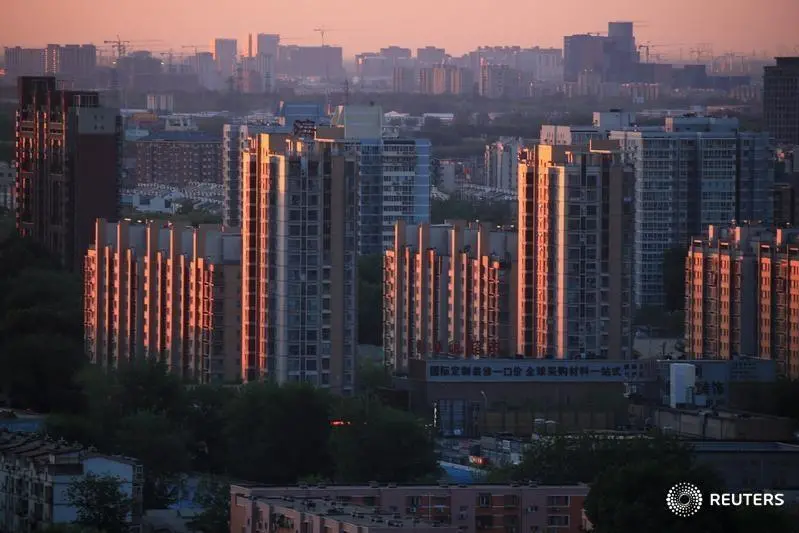PHOTO
HONG KONG - Chinese banks are set to take a hit to asset quality from mortgage business as growing numbers of homebuyers threaten to stop loan repayments to protest against unfinished apartments, analysts said.
The mortgage bad-loan ratios for banks could rise three- to five-fold as a result of homebuyers stopping mortgage payments, analysts estimate, adding that the protests will significantly add to the lenders' risk exposure to the cash-starved property sector.
The widening homebuyer protest in China adds to the woes for the country's property sector, which accounts for a quarter of the economy, and for banks that have been dented in the past year by a string of developers defaulting on their debt obligations.
Chinese investors dumped banking and real estate stocks on Thursday, fearing deepening trouble in the property sector would begin to hit the financial system. The CSI300 Bank index fell as much as 3.3%.
Up to 1.5 trillion yuan ($220 billion) of mortgage loans are linked to unfinished residential projects in China, ANZ said in a report. That could be at risk if the homebuyers protest, currently focussed on central Chinese cities, widens.
Developers involved in these unfinished projects include cash-strapped China Evergrande Group and Sinic Holdings, according to analysts and media reports.
Evergrande declined to comment. Sinic did not immediately respond to request for comment.
Chinese authorities held emergency meetings with banks after growing alarmed that an increasing number of homebuyers are refusing to pay mortgages on stalled projects, Bloomberg reported on Thursday, citing people familiar with the matter.
"A primary concern is if this snub spreads too quickly and more home buyers follow suit only because their projects are going slowly, or simply out of a pessimistic outlook for the property sector," said Shujin Chen, equity analyst at Jefferies.
Though banks own the pre-sold apartments as collateral, they would still likely suffer a loss, because the assets are uncompleted. Waiting for completion could expose the banks to a risk of a substantial drop in real estate values.
"It's challenging to sell the apartments under current market conditions. Plus, if there comes a massive wave of home auctions, prices will crash," said Xiaoxi Zhang, China finance analyst of Chinese research group Gavekal Dragonomics.
A fund manager also said banks would get zero equity back if they seized uncompleted assets.
"That's going to wipe out half of the existing bank equity; it's worst than subprime," he said, referring to the US subprime mortgage crisis that began in 2007. The fund manager asked not to be named, due to the sensitivity of the matter.
The four major state banks, as well as Postal Savings Bank of China, China Merchants Bank and Industrial Bank, are the financial institutions with the biggest mortgage exposure, according to Jefferies.
Banks including Agricultural Bank of China, China Construction Bank and Industrial Bank said on Thursday their mortgage books tied to uncompleted or delayed home projects were relatively small and the risk was controllable.
Industrial and Commercial Bank of China Ltd, Bank of China, Postal Savings Bank of China and China Merchants did not immediately respond to requests from Reuters for comment.
Share market participants said authorities should intervene early to resolve the crisis, as distressed property developers would probably be unable to resume construction in the near term due to their liquidity crunch.
"Both social stability and financial stability will be endangered in the worst case," Gavekal Dragonomics' Zhang said.
($1 = 6.7332 Chinese yuan renminbi)
(Reporting by Clare Jim and Xie Yu; Additional reporting by Samuel Shen in Shanghai; Editing by Sumeet Chatterjee)





















